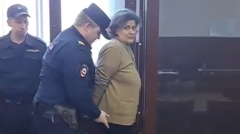Anna Alexandrova, a hairdresser from St. Petersburg, was sentenced to five years and two months for allegedly spreading fake news about the Russian army, following accusations from her neighbor. The case underscores an escalating crackdown on dissent as authorities continue to silence opposition voices in the wake of the Ukraine conflict.
Hairdresser Sentenced as Dissent Crackdown Intensifies in Russia

Hairdresser Sentenced as Dissent Crackdown Intensifies in Russia
A St. Petersburg hairdresser received over five years in prison for alleged anti-war social media posts, amid ongoing governmental repression of dissent.
A hairdresser from St Petersburg, Anna Alexandrova, has been sentenced to five years and two months in prison on charges of disseminating false information about the Russian military. Her conviction arises from a total of eight supposed anti-war posts she shared on social media, which she asserts were misrepresented and tied to an ongoing dispute over property with a neighbor. This neighbor reported Alexandrova after she allegedly sent her daughter war-related images from Ukraine.
The legal framework for such charges in Russia emerged shortly after the invasion of Ukraine in February 2022, with authorities ramping up actions against dissenters and critics, leading to the imprisonment of many independent voices and journalists. In a related case, four Moscow journalists received five and a half-year sentences for their associations with what the government termed an "extremist organization" linked to opposition figure Alexei Navalny, who was found dead in prison last year under controversial circumstances.
Alexandrova's legal troubles began in November 2023, highlighting the severity with which the Kremlin is treating any perceived criticism. The situation was intensified by a history of animosity between Alexandrova and her neighbor, who initially collaborated with her on local environmental issues before disputes turned sour, ultimately landing Alexandrova behind bars when new legal interpretations came into play.
The implications of her case ripple beyond individual circumstances. It evokes memories of the Soviet Union's past policies of informing, where neighbors turned against each other under duress, reinforcing a climate of fear. As dissent becomes increasingly dangerous, the legal battles continue, with some attempting to challenge the legitimacy of these laws in higher courts. This climate of repression raises concerns over free expression and the future of dissent in Russia.




















